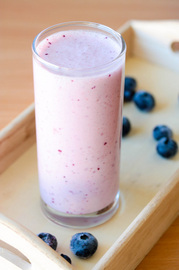 by Chelsea Jenter, MPH Your thoughts, beliefs, and expectations about what you are eating may actually influence how your body processes food. The idea that weight loss is just a numbers game – calories in versus calories out – may not be as simple as we once believed. Previous blog posts by Stephanie Linakis and Avik Chatterjee refer to the challenges and complexity of diets and food choices. A 2011 study in Health Psychology further complicates things by suggesting that your mindset about the food you are eating can influence how full or hungry you are after you eat it. The 2011 study, led by Alia Crum and colleagues, involved giving two participant groups the same milkshake, but different information about the nutritive composition of the shake. One group was given a milkshake that was advertised as a 620-calorie “indulgent” shake. The other group was told that the very same shake was a 140-calorie “sensible” shake. Before and after the shake was served, the investigators measured each participant’s ghrelin level, also known as the “hunger hormone.” When your ghrelin levels are high, you feel hungry and when they are low, you feel satiated. In this study, post shake-consumption ghrelin levels were different in the two groups. People who thought they had eaten the “indulgent” shake actually had lower ghrelin levels after eating it – they were more satiated (e.g., less hungry) - than those who consumed the “diet” shake.
Here is another way our minds can mess with us. Another recent study by Dipayan Biswas and colleagues examined food texture and the participants’ perception of calories. This study showed that people tend to think that smoother and softer foods have higher calorie content than hard or rough foods. They also found that these assumptions about calorie intake then influence subsequent eating behaviors such as decisions around food quantity and quality. How can we use this knowledge to more successfully manage weight? If we look at these two studies together, we see that dieters may think that they should eat smooth foods that are labeled as indulgences. You and I both know that won’t be the next fad diet, nor should it be. As is the case with most research, additional studies are needed in order to figure out how research findings could benefit populations at large. And, as Karen Switkowski said her recent post, digesting advice from various nutrition studies is itself a difficult task. What is clear from these two studies, however, is that it is not just calories influencing your hunger – your head is involved too.
0 Comments
Your comment will be posted after it is approved.
Leave a Reply. |
©2017 WeighingInBlog. All rights reserved. 401 Park Drive, Boston, MA




 RSS Feed
RSS Feed

